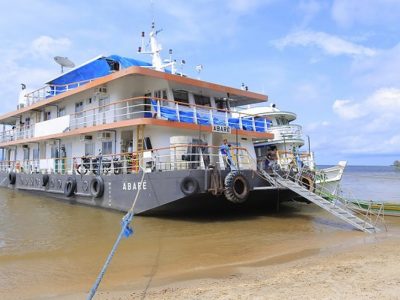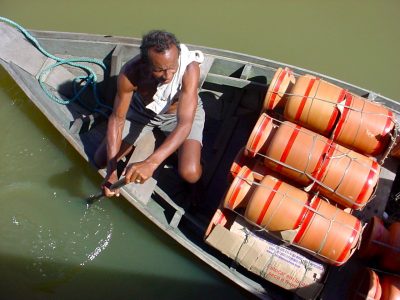Community Health
Health, happiness of the body. Happiness, health of the soul. The concept symbolizes a broad understanding of health, linked to not only physical, but also social, emotional and environmental well-being. PSA aims to join forces with public policies to guarantee the right to health and increase inclusion of Amazonian communities, making assistance and basic rural services more accessible, with an emphasis on prevention and education, and also using art and recreation to promote “saúde & alegria” (health & happiness) as methods of action.
When PSA first began its activities in Western Pará in the mid-1980s, it was faced with a troubling situation: high maternal and child mortality rates, children dying from diarrhea for drinking untreated water straight from the rivers, and the absence of minimal conditions of sanitation.
Due to their geographic isolation, residents seeking healthcare were forced to travel to the nearest cities, only to face long lines, insufficient services and unaffordable accommodations. With this lack of basic and preventive actions in the communities, primary and simple diseases worsened and led to an emergency health situation in the region.
Thus, in 1987 PSA began offering assistance and education to fight and prevent primary diseases. In this first phase, the right to health was the focus, with the training of replicating agents and midwives; the implementation of basic sanitation technologies; the expansion of vaccinations; campaigns and task forces; and recreational-educational activities through the Mocorongo Circus. Additionally, Local Commissions of Integrated Health (CLIS) were created to enable the communities to participate in the management of the activities.
Even with substantial measures in prevention, education and basic sanitation, which in particular improves child mortality indicators, there remained the challenge of finding an inclusive health care model for these rural populations that are so isolated from urban centers. That is when PSA started work in 2006 on implementation of the hospital-boat model for regular assistance to the riverside populations, taking the Family Health Program of the Unified Health System (SUS) to the communities.
Currently, PSA guides its operation on two fronts: primary health care and basic sanitation, both involving education and prevention.
The Abaré Model
Water and Sanitation
Rádio Mocoronga
Contact
- Av. Mendonça Furtado, 3979
- +55 93 3067-8000
- +55 93 99143-1091
- psa@saudeealegria.org.br
HOW TO HELP
Projeto Saúde & Alegria © 2020
Agência Fervo







